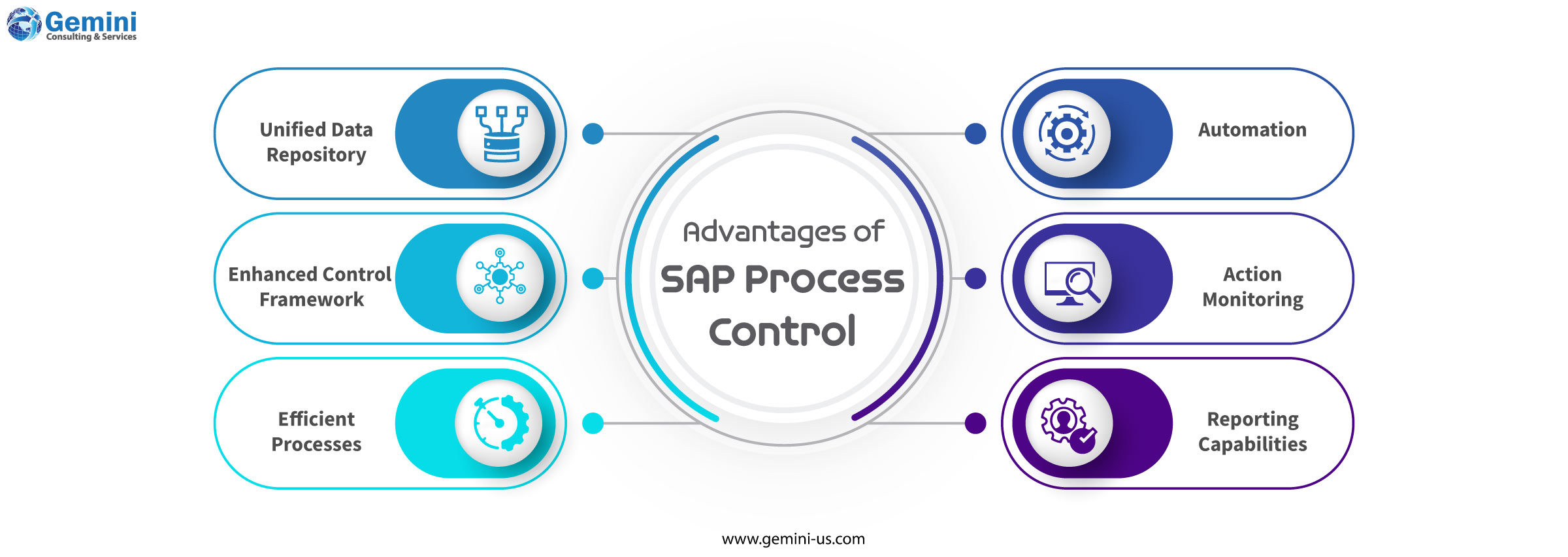In the current regulatory environment, organizations are increasingly required to implement strong internal control systems to effectively manage risks. SAP Process Control, part of the SAP governance, risk, and compliance (GRC) suite, addresses this need by centralizing internal control documentation and enabling automated monitoring. Let’s examine how SAP Process Control helps organizations meet regulatory demands and delivers business advantages.
Meeting Regulatory Demands with SAP Process Control
Organizations are subject to various regulations that require senior management to create robust internal control frameworks to minimize risks. Here’s how SAP Process Control helps address these requirements.

Public Company Accounting Oversight Board (PCAOB) Standards: The PCAOB sets standards such as AS 2201, which focuses on auditing internal financial reporting controls. Enterprises can meet these standards by tools offered by SAP Process Control. Both the design and effectiveness of controls can be tested by these tools. It helps with control selection, testing, and documentation, ensuring adherence to auditing norms.
Sarbanes-Oxley Act (SOX): The Sarbanes-Oxley Act (SOX) mandates that companies are responsible for their financial statements and requires periodic assessments of internal controls related to financial reporting. SAP Process Control assists in documenting and assessing internal controls, which supports compliance with SOX regulations. It provides features for evaluating control design, conducting self-assessments, performing manual controls, and automated monitoring, along with standard reports to track control status.
Committee of Sponsoring Organizations (COSO) Framework: The COSO framework emphasizes the critical role of internal controls in enhancing the effectiveness of processes. SAP Process Control enables organizations to classify controls according to COSO's five elements: control environment, risk assessment,control activities, information and communication, and monitoring. This in turn improves governance and bolsters the achievement of organizational goals.
Gemini Consulting & Services can guide businesses in leveraging SAP Process Control to manage security and compliance risks effectively. Contact us to learn how you can address security breaches and ensure compliance.

SAP Process Control is crucial for overseeing and managing internal controls within organizations. As a result, it has many features that offer various benefits. Here’s how businesses can gain from using SAP Process Control:
- Unified Data Repository: By consolidating control processes and designating responsibility, SAP Process Control fosters accountability and ensures consistent control execution across the organization.
- Enhanced Control Framework: The solution aligns controls with organizational objectives, improving governance and accountability by reinforcing control structures.
- Efficient Processes: SAP Process Control simplifies control scope determination and effectiveness testing, making it easier to evaluate controls and address issues. This helps organizations manage risks more efficiently.
- Automation: It automates control testing and monitoring, providing continuous oversight without manual intervention and enabling swift action in response to discrepancies.
- Action Monitoring: The system tracks control evaluations and remediation efforts, ensuring that issues are resolved promptly through automated reminders and escalation features.
- Reporting Capabilities: SAP Process Control offers various reports for real-time compliance monitoring and assessment results. This helps enterprises to generate produce regular updates for senior management and customize them for specific requirements.
SAP Process Control is essential for optimizing compliance processes, meeting regulatory requirements, and reaping numerous business benefits. Its functionalities help organizations build a robust internal control system and manage risks effectively in today’s fast-paced business world.



